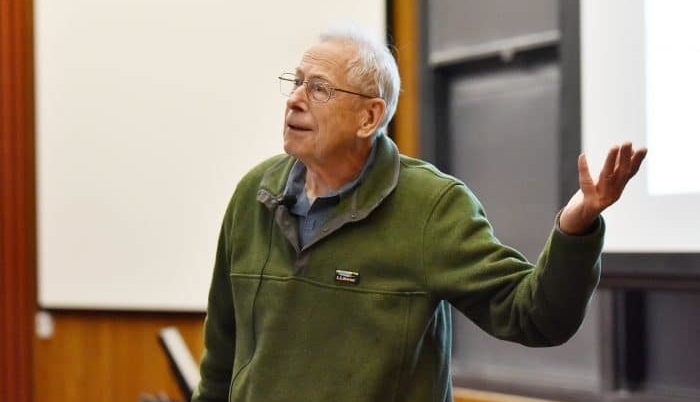James Peebles on Physics, Poetry, and Where We Are
Share

“He is eminently qualified for advanced study and research, and there is a real chance that he might become a physicist of definite distinction.”—from a letter of recommendation for Jim Peebles’ 1958 Woodrow Wilson Fellowship
To hear Jim Peebles WF ‘58 talk about his extraordinary career as one of the founders of modern cosmology, you’d think it was more poetry than physics. And maybe it is.
Dr. Peebles’ half-share of the 2019 Nobel Prize in Physics, announced in early October, comes in recognition of his “contributions to our understanding of the evolution of the universe and Earth’s place in the cosmos.” The award citation adds, “His theoretical framework, developed since the mid-1960s, is the basis of our contemporary ideas about the universe.”
When he first took an interest in physical cosmology in the early 1960s, Dr. Peebles explains, the field was so small that there was virtually no literature. “I could find out what was going on by talking to a few people,” he says. “There were data. There were theories. There was work in progress to try to improve both—but it was happening at such a slow rate, such a contrast to the situation now. Of course, the notion of big science didn’t exist then, but if we had had the term, we would have said, ‘Cosmology was a very small science.’”
So Dr. Peebles, who had since childhood been fascinated with figuring out how things worked, turned to figuring out how the universe formed. He and his colleagues at Princeton—he arrived there from Manitoba as a Woodrow Wilson Fellow in 1958 and has remained ever since—predicted the cosmic microwave background radiation that would be left over from the Big Bang. Once it was detected, he also framed understandings of how galaxies and other cosmic structures would have formed, based on these energetic “leftovers” of early processes. From this work also evolved contemporary theories about dark matter and dark energy, all speculative before Dr. Peebles’ pioneering approaches to precision modeling.
He would later characterize his interests in cosmology as “the underappreciated issues”—seeming discrepancies that might be clues: an unexpectedly low average density of matter in the universe, bulges (or their absence) in galactic structures, and so on. He clearly enjoys being a gentle provocateur. “I’m still acting in that way,” he says. “I remember a young colleague saying to me, ‘You’re just saying this to annoy. Do you remember Alice in Wonderland?’”
This kind of curiosity, occasional contrariety, and a concomitant willingness to explore what may be quirks or dead ends, Dr. Peebles believes, are the essence of basic research—and are perhaps at risk of being lost in a world that primarily values applied results. “How do you justify the funding of research that cannot be monetized?” he asks. “It satisfies the human drive to understand where we are. I hope I’m not being presumptuous in putting poetry into the same class.”
Not surprisingly, however, Dr. Peebles doubts that this drive ever truly can be satisfied. “There are those who talk about a final theory of everything,” he says. “I have never liked that notion. Maybe because in part I hate the thought that there’s an end to it all. But in part I think, more logically, we’ll never know if we have the final theory. How do you know there isn’t something deeper behind it?”
Stay Engaged
Get More News
Join our mailing list to get more news like this to your mailbox.
Support Our Work
Help us invest in the talent, ideas, and networks that will develop young people as effective, lifelong citizens.
Ways to Support Us